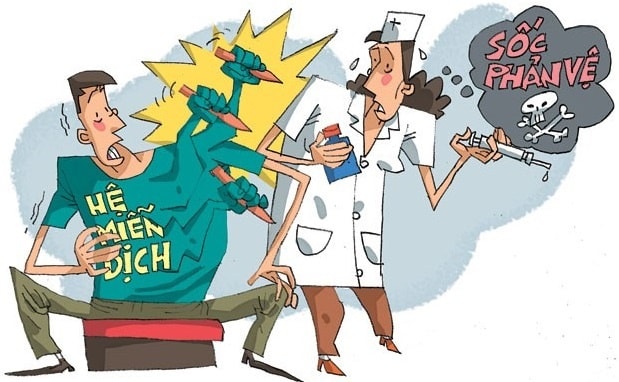Anaphylactic shock: The fear of patients and doctors
(Baonghean.vn) - After the incident of 7 dialysis patients dying from suspected anaphylactic shock in Hoa Binh, many people wonder, what is anaphylactic shock and how dangerous is it to the patient's life?
1. What is anaphylactic shock?
Anaphylaxis is a potentially fatal condition of shock due to respiratory and circulatory failure. In sensitive people, anaphylaxis can occur within minutes, or possibly hours, of exposure to the substance (allergen) to which you are allergic. Some people may develop anaphylaxis for no apparent reason.
Anaphylaxis is an extremely severe, life-threatening allergic reaction that can occur within seconds or minutes of exposure to something you are allergic to, such as bee venom or peanuts.
Anaphylaxis can cause a person to go into shock, with a sudden drop in blood pressure and narrowing of the airways, blocking normal breathing. Signs and symptoms of anaphylaxis include a weak, rapid pulse, skin rash, nausea, and vomiting.
2. Causes of anaphylactic shock
 |
| If not treated promptly, the risk of death from anaphylactic shock is very high. |
There are many causes of anaphylactic shock, not just simply due to vaccination as many people mistakenly believe.
Drugs: Drugs are the leading cause of anaphylactic shock in patients. Drugs administered into the body by intravenous injection, intramuscular injection, subcutaneous injection, intradermal injection; oral, inhaled, eye drops, vaginal suppositories or topical medications... can all cause anaphylactic shock. However, intravenous injection is the most dangerous. All types of drugs can cause anaphylactic shock in patients, the most common being antibiotics, anti-inflammatory pain relievers, muscle relaxants, anticonvulsants, contrast agents, anesthetics, sedatives...
Food: Foods of animal or plant origin can cause anaphylactic shock.such as: mackerel, tuna, shrimp, prawn, snail, pupa, eggs, milk, pineapple, potatoes, peanuts, soybeans, nuts and additives...
Insect venom: When bitten by insects such as bees, snakes, centipedes, scorpions, spiders... the amount of toxins secreted in the venom will cause anaphylactic shock for the victim... and a number of other causes.
3. Symptoms of anaphylactic shock
Anaphylaxis is most likely to occur in people who are sensitive to bee stings, eat foods containing allergens, or take medications to which they are allergic.
The appearance of the following signs and symptoms within a few minutes after exposure to an allergen is a fairly clear sign of anaphylaxis, specifically: Respiratory tract spasm, including wheezing, swelling of the tongue and throat, difficulty breathing; Shock with low blood pressure; Rapid and weak pulse, dizziness or fainting; Hives and itching, hot flashes or pale skin; Nausea, vomiting or diarrhea, abdominal cramps, incontinence; Headache, dizziness, sometimes coma, dizziness, restlessness, struggling, convulsions.
 |
| Anaphylaxis can occur very soon or sometimes later after a few hours of exposure to the allergen. |
The severity of anaphylactic shock depends on the sensitivity of each individual, the amount and speed of absorption of foreign substances into the body and depends on the time of treatment. Early signs to note: Itching of hands, feet, numbness of lips, tongue, difficulty breathing, rapid heartbeat, feeling restless, panic.
4. What to do to prevent anaphylactic shock
Anaphylactic shock can occur very early or later after a few hours of exposure to the allergen. But when it occurs, it will progress very quickly within a few hours and turn into a critical state. Therefore, preventing anaphylactic shock is always an urgent requirement for people with allergies.
First of all, if you have a history of allergies, inform your doctor about previous allergens, especially when being prescribed new medications. Moreover, always carry anti-shock medications with you.
 |
| After vaccination, parents need to pay attention to their children's reactions to detect any allergic reactions and handle them promptly. Photo: hanoimoi.. |
While injecting the drug, if you experience unusual feelings such as restlessness, panic, fear, numbness of the tongue... tell the doctor immediately to stop the injection and promptly handle it as anaphylactic shock. After the injection, you should stay in the injection room for about 15 - 30 minutes, do not leave immediately to prevent anaphylactic shock from occurring later depending on each person's constitution.
Use medicine properly, safely, and as prescribed; When eating strange foods, try a small amount to see how your body reacts. Wait 24 hours before eating again if you do not see any unusual symptoms. People with allergies can easily get shocked by eating foods containing strange substances.
If you see a patient having an allergic reaction with signs of anaphylaxis, call emergency services immediately. Check the names of specific medications the patient may have with him to treat the allergic reaction. Use the medication as directed.
Place the patient in a lying position with the feet higher than the head, loosen clothing, and cover with a blanket. If there is vomiting or bleeding from the mouth, turn the patient onto his or her side to prevent choking. If there are no signs of circulation (breathing, coughing, or movement), begin CPR.
Kim Ngoc
(Synthetic)
| RELATED NEWS |
|---|


